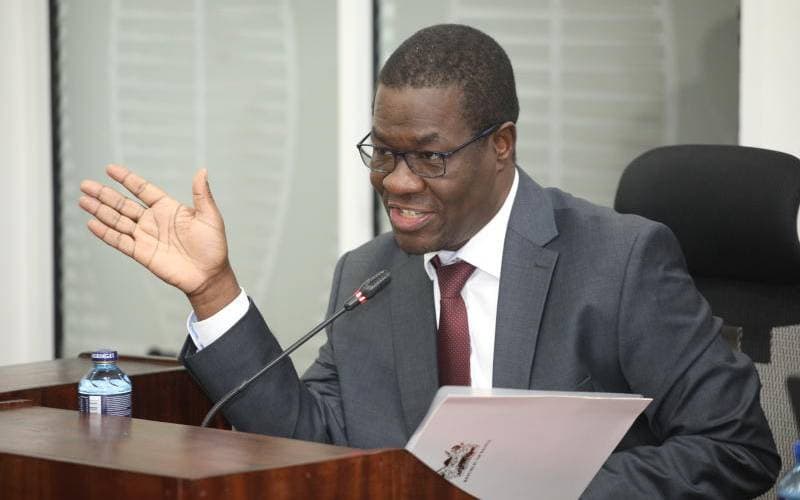We're loading the full news article for you. This includes the article content, images, author information, and related articles.
A legislative proposal to allow county governments to charge fees for electricity infrastructure wayleaves has ignited a fierce debate, pitting the Senate against the Energy Ministry, with Kenyan consumers facing a potential 30% tariff hike.

A sharp division has emerged between the Senate and the Ministry of Energy over the Energy (Amendment) Bill, 2025, which seeks to grant county governments the authority to impose levies on energy infrastructure passing through their jurisdictions. The bill, sponsored by Siaya Senator and Senate Energy Committee Chairman Dr. Oburu Oginga, has been championed as a critical move to expand county revenue streams but has been met with stiff resistance from Energy Cabinet Secretary Opiyo Wandayi, who warns it will inevitably lead to higher electricity prices for consumers.
During a heated session on Tuesday, October 28, 2025, with the Senate Standing Committee on Energy, CS Wandayi argued that the proposed amendments would undermine national efforts to lower the cost of living by driving up electricity tariffs. "The proposed changes would negatively impact electricity tariffs currently enjoyed by Kenyans, including connection charges and periodic bills paid by consumers," Wandayi stated, urging the Senate to reject the bill.
Proponents of the bill, led by Senator Oginga, argue that counties are constitutionally empowered to impose charges for services they provide, including the use of land for infrastructure wayleaves. They contend that for too long, Kenya Power and Lighting Company (KPLC) has utilized county land for its network of power lines and transformers without adequate compensation, depriving devolved units of much-needed revenue. The bill specifically seeks to amend Section 223 of the Energy Act, 2019, which currently prohibits public bodies from levying such charges without the written consent of the Energy Cabinet Secretary—a provision KPLC has consistently relied upon.
The dispute is not new, reflecting a long-standing feud between counties and KPLC over billions of shillings in contested debts. Several county governments, including Nairobi, have demanded substantial payments for wayleave rights, often in response to KPLC's demands for unpaid electricity bills. In February 2025, this tension escalated when Nairobi County officials retaliated against power disconnections by dumping waste at KPLC's headquarters, demanding a settlement of a claimed Sh4.7 billion in wayleave fees against KPLC's Sh1.5 billion electricity bill.
The financial implications for the Kenyan public are stark. Kenya Power's Managing Director and CEO, Joseph Siror, has repeatedly warned that if counties are allowed to impose these levies, the utility would face an additional annual cost of approximately Sh63.8 billion. Siror explained that this cost would inevitably be passed on to consumers, potentially increasing electricity prices by over 30%. "Under the proposal to charge wayleaves on electricity infrastructure at a cost of Sh200 per meter, this translates into Sh63.8 billion per year... The overall impact is that electricity will become unaffordable for a majority of Kenyans," Siror stated during a meeting with the Kenya Editors' Guild earlier in the year.
This warning comes as consumers have seen a slight reprieve in power costs, attributed to a strengthening shilling and a tariff review in April 2023. However, the introduction of wayleave charges could erase these gains and significantly impact household budgets and the cost of manufacturing.
The Senate Energy Committee is now tasked with navigating this complex issue, balancing the counties' legitimate quest for financial autonomy against the national imperative to maintain affordable energy. During the tense committee meeting, senators like Beatrice Ogolla and Danson Mungatana criticized the CS's position as undermining devolution, while Senator Dr. Boni Khalwale sided with Wandayi, citing concerns over accountability in county-level levy collection. CS Wandayi has called for the involvement of all key stakeholders in the sensitive discussions. The Council of Governors has also threatened legal action to challenge the existing law that shields Kenya Power from paying wayleave fees, indicating a multi-front battle over the issue. The outcome of this legislative and political clash will have far-reaching consequences for Kenya's energy sector, the future of devolution, and the wallets of millions of Kenyan citizens.
Keep the conversation in one place—threads here stay linked to the story and in the forums.
Other hot threads
E-sports and Gaming Community in Kenya
Active 8 months ago
The Role of Technology in Modern Agriculture (AgriTech)
Active 8 months ago
Popular Recreational Activities Across Counties
Active 8 months ago
Investing in Youth Sports Development Programs
Active 8 months ago
Key figures and persons of interest featured in this article